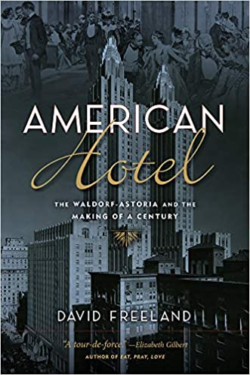In American Hotel: The Waldorf-Astoria and the Making of a Century, historian David Freeland recounts the history of not just an American hotel, but, arguably, the American hotel. From the opening as the Waldorf at its first location at Fifth Avenue at 33rd Street in 1893, then more than doubling in size in 1897 into the Waldorf-Astoria, the hostelry rose to prominence on the local, national, and international stage. Opening for business on October 1, 1931, the new uptown Waldorf-Astoria struggled through the Depression, but rose to unparalleled prominence in the postwar years. Functioning like an American palace, the Waldorf served as a favored venue for United Nations diplomats and the hotel of choice for American Presidents until its shuttering in 2017. The Waldorf-Astoria’s story, Freeland writes, “is that of America in the twentieth century, and it would be difficult to imagine any hotel bearing the same degree of influence again.”
David Freeland
David Freeland is also the author of Automats, Taxi Dances and Vaudeville: Excavating Manhattan’s Lost Places of Leisure and Ladies of Soul. As a historian and journalist, he has written for numerous publications. Freeland lives in New York, where he leads walking tours and gives lectures on the city’s culture and history.
